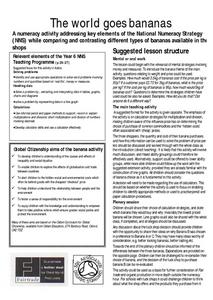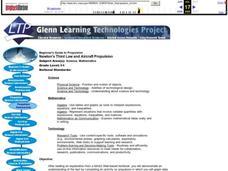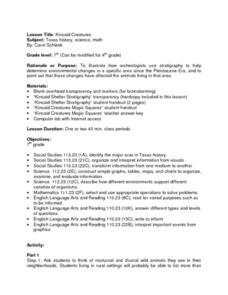Curated OER
Discussion Sheet 1: Domain & Range of a Function
In this domain and range instructional activity, students solve inequalities, determine the domain and range for a function, identify the limits, and sketch graphs of a function. This two-page instructional activity contains nine...
Pennsylvania Department of Education
Alike and Different
Students compare and contrast objects and are introduced to a Venn Diagram. In this alike and different instructional activity, students make observations regarding properties of objects. Students classify object and build ideas about...
Curated OER
Lift Equation Problem Set
Pupils, after reading an explanation from a NASA Web-based textbook, demonstrate an understanding of the text by using it, along with FoilSim, to complete an activity to graph and interpret the lift equation.
Curated OER
Review for the Algebra One SOLs
Students review the standards for Algebra I. Using the text, they discover two problems that match each standard and solve them showing all steps on paper. They create a PowerPoint slide for each problem and go through the correct...
Curated OER
Introduction To Calculus
Students engage in a lesson that is about an introduction to the course of calculus. They practice some of the basic concepts and solve some problems applying different principals of calculus. The teacher uses the sample problems...
Curated OER
The World Goes Bananas
Learners comprehend the causes and effects of inequality and social injustice. They explore the effects of globalization and trade between countries. Students discuss the hidden social and environmental costs which often lie behind goods...
Curated OER
Gummy vs. Gum
Students explore numbers patterns and write equations to describe the pattern. They apply the equations to further the patterns.
Curated OER
Chart Trivia
Learners practice addition and subtraction problems and answer questions using greater than and less than. They chart information to create a graph on the computer.
Curated OER
Newton's Third Law and Aircraft Propulsion
Learners research propulsion, graph data, and interpret the results.
Curated OER
Square Milk Bottle Crates
Learners attempt a problem that Students has the potential to have more than one solution. Hence the problem is accessible to a wide range of learners. The problem is essentially about finding patterns and this is typical of a number of...
Curated OER
Perimeters, Patterns, and Conjectures
Students discover patterns and write conjectures relating to perimeters and polygons. Working in cooperative learning groups, they use manipulatives and graphic organizers to solve problems then answer a series of questions in which they...
Curated OER
Using Representations to Model Problems
student make predictions or draw conclusions based on physical and visual representations of profit and sales. They model problems with physical materials and visual representations, and use models, graphs and tables to draw conclusions...
Curated OER
Permutations
In this permutations instructional activity, 6th graders solve and complete 5 different types of problems. First, they write a simple conceptual art plan with no more than 3 instructions. Then, students use graph paper and a pencil to...
Curated OER
Mass & Velocity Effect
Students, after reading the explanation given below, use FoilSim to complete the activity to fulfill the specifications of a given airfoil and then plot and interpret graphs.
Curated OER
Best Practices of Technology Integration
Students participate in a lesson in order to practice using systems of equations in order to graph them. A cumulative project in the form of a brochure, web page, or interactive kiosk make this lesson more engaging.
Alabama Learning Exchange
Trapezoids: What's Equal or Right About Them?
Pupils explore the concept of trapezoids. In this trapezoids instructional activity, young scholars identify legs and bases of a trapezoid. Pupils discuss the similarities and differences between isosceles trapezoids and right...
Curated OER
Wing Specifications
Ninth graders use FoilSim to fulfill the specifications of a given airfoil (wing) and plot and interpret graphs.
Curated OER
Reduce and Reuse
Students conduct a lunch waste audit by recording each item they throw away at lunch. They graph class lunch waste. They use this information to devise a plan of action to reduce lunch waste. There is also an activity to make paper.
Curated OER
Beans and Birds: A Natural Selection Simulation
Students examine the problem concerning the evolution of seed color in pinto bean plants "How does natural selection change the frequency of genes or traits over many generations"? Students work in teams to design an experiment that...
Curated OER
Kincaid Creatures
Students brainstorm a list of nocturnal and diurnal wild animals they see in their community and discuss how the animals would be different if they were living during the Ice Age. Using a handout, they discover how archeologists record...
Curated OER
Area of Parallelograms
Seventh graders review the process of finding the area of a rectangle and complete a couple of examples as a class. They discuss what a parallelogram is and what the formula would be for finding its area. They listen to an explanation...
Curated OER
1-4 Study Guide Integration: Statistics Stem-and-Leaf Plots
In this statistical worksheet, students organize given data into a stem-and-leaf plot. They then use their organize data to answer given questions. Students create two stem-and-leaf plots and answer five questions. An answer sheet is...
EngageNY
Complex Numbers and Transformations
Your learners combine their knowledge of real and imaginary numbers and matrices in an activity containing thirty lessons, two assessments (mid-module and end module), and their corresponding rubrics. Centered on complex numbers and...
Curated OER
Calculate the Slope of a Line Using Two Points
Find that slope! This video does an excellent job of demonstrating how to use the slope formula to find the slope of a line using two points. The instructor first reviews the definition of slope of a line, then works three problems using...

























